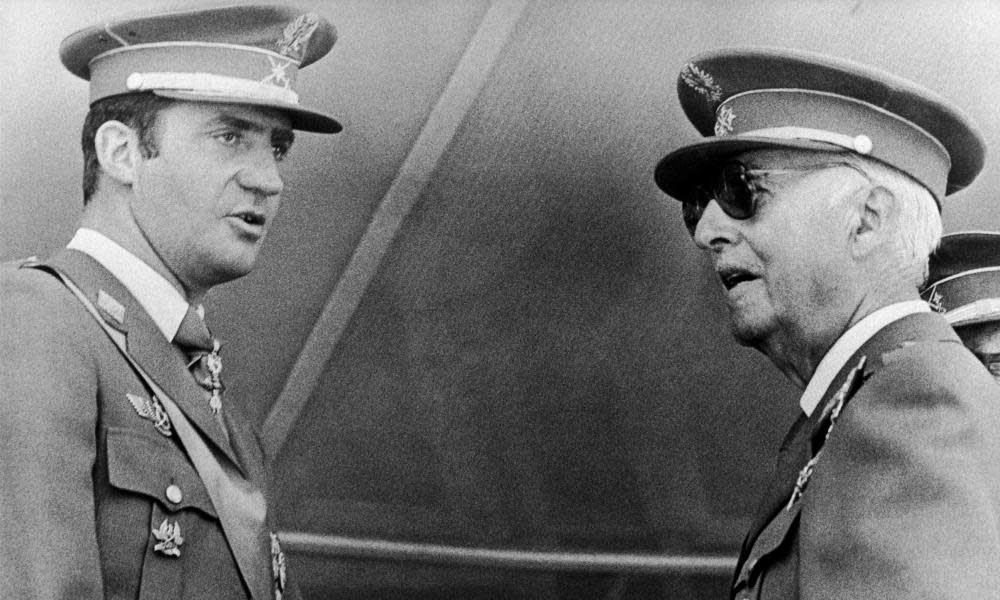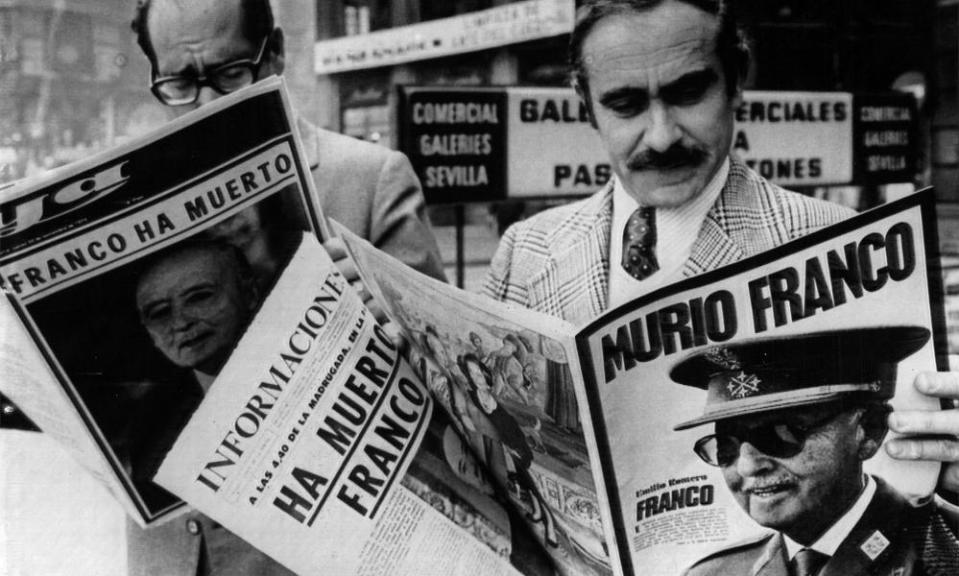Archive, 1975: Juan Carlos takes over power from dying Franco

Prince takes reins from dying Franco
by Walter Schwarz
31 October 1975
Madrid
Spain has a new head of state, although General Franco is still alive. Prince Juan Carlos, the designated successor, today took over power “provisionally” – while Franco was lying critically ill with a weak heart, stomach bleeding, and Parkinson’s disease.
The prime minister, Señor Arias, said tonight that the 37-year-old Prince had agreed to the “temporary” takeover, a course which he had strenuously resisted throughout Franco’s long illness. The Prince seems to have been finally persuaded during a meeting lasting an hour with Señor Arias today.
The Prince will preside as Provisional Head of State at the weekly cabinet meeting tomorrow. Reliable reports said he had already been sworn in by Señor Rodríguez de Valcárcel, president of Parliament and of the Council of the Realm.
Related: Juan Carlos has fled Spain, but questions over his past will follow him | Giles Tremlett
It is not known if Franco, who has lately been reported to be in a lucid condition mentally, agreed to hand over power. The procedure was carried out under Article II of the law of succession, the Article invoked last year when the Prince assumed power, with Franco’s permission, for five weeks, only to have it abruptly snatched away when Franco recovered from phlebitis.
This time Prince Juan will no doubt stay in office. But in form his takeover was doubly provisional. If Franco were to die during the night it would cease to be effective, and another procedure for the transfer will go into operation. Under this, a three-man Council of Regency would take over power and the Prince would later be proclaimed King by the Council of the Realm and Parliament. It is also temporary in that, if Franco were ever to recover, the arrangement would again be at an end.
As General Franco survives yet another day – the eleventh since his first serious heart attack – pressure mounted on the Prince to change his mind and end the long power vacuum.
Crucial decisions are to be taken at the weekend on the Spanish Sahara. And the longer the Prince held back the stronger would be the opposition to his succession from left-wing parties, as well as the Christian Democrats and other Centre groups, who want a clean break with Francoism and a referendum on whether Spain should become a monarchy or a republic.
The Prince already knows that Franco stands no chance of recovering from his illness sufficiently to take over power again. His objection hitherto has been that another “temporary” takeover would harm his linage and would leave him yet again in Franco’s shadow.
Spain takes it all mildly
by Walter Schwarz
1 November 1975
Madrid
The takeover of power by Prince Juan Carlos was today generally greeted with a feeling of mild relief that the long interregnum is over. The emotion in many cases went little deeper.
Nobody now expects General Franco to return to power. The takeover had inevitably downgraded the importance of his illness, which pursued its course today. Bulletins said his condition, still “grave,” was basically unchanged, though there were symptoms of inflammation in the abdominal wall and continuing signs of heart “insufficiency.”
Broad middle class opinion was probably summed up by Ya, the high circulation daily paper controlled by the Church, which said in a leader that the Prince had “the support and confidence of most of the people” but added that liberalisation was necessary to avoid violence. The wife and sister of two well-known political prisoners said today that they feared a prison “massacre” by right-wing mobs in an emotional reaction when Franco dies.
Natalia Sartorius, whose husband Nicholas is serving six years for organising a clandestine trade union, and Vicenta Camacho, whose brother Martelino Camacho, was an associate of Sartorius, said that Fascist gangs “quite often get into prison and deliberately provoke confrontation and disorder there so that prisoners can be beaten up.”
The women were quiet and composed as they talked to journalists in a hotel here. Hotel staff protested at the holding of what they called a “political meeting,” but Spanish journalists insisted it continued. The meeting was perhaps the first tangible sign of a loosening up in the atmosphere of political repression now that the Prince has taken over.
Meanwhile, opposition groups of both the moderate Democratic Platform (Socialist, Christian Democrats, and others) and the communist-dominated Democratic Junta, were again meeting jointly to try to work out a common stand towards the new regime.
A junta spokesman told me there had been “definite progress” but unity had not yet reached the stage where a joint statement could be issued. The junta wants outright condemnation of the succession, while moderate elements in the platform prefer to give the Prince a chance to state his intentions, and hope for an eventual place in a Coalition Government.
Editorial: the prince who said nothing
1 November 1975
In the short term it is good news that Prince Juan Carlos has agreed to become Spain’s temporary Head of State. The news is good because it shows that Spain is no longer content to be hypnotised by its dying leader. Franco’s power to prevent all change has been broken. It is also good news, again in the short-term, because it means that Spain has a Government. No one knows whether Juan Carlos will prove to be much of a King. So far he has been Franco’s creature and Franco’s shadow. His public statements have been cautious to the point of nullity. But he is at least better fitted than Franco, who is desperately ill, to take decisions about the future of the Sahara. There is business to be done In Madrid and now at last there is someone fit enough to do it. Which is a gain in itself.
Related: King Juan Carlos of Spain: a fairytale told by politicians | Miguel-Anxo Murado
The world must recognise too, to Juan Carlos’s credit, that he has overcome a natural reluctance to accept another temporary mandate. Kings (for a king be is) do not expect to be appointed for periods of five weeks and then sacked, which is what happened to him last year. However, he has now agreed to serve once more as a temporary monarch and has done so in response to the reasonable entreaties of prime minister Arias.
This is what is known about Juan Carlos. What is not known about him is what he will do and whether he is strong enough to do it. He has so far walked in the shadow of the dying Franco to whom he owes everything except his French ancestry. The underground opposition, underground because they have no choice, is probably right to object to him because he has never hinted that he disagrees with Franco about anything. There are times when silence Is golden, but the last months have not been one of them. The negative political fact about Juan Carlos is that nobody knows whether he accepts that change in Spain is necessary. How, for example, does he react to yesterday’s editorial challenge in the influential Catholic paper Ya?
“In the Interest of a stable future a deep and in many ways radical reassessment of the political situation has become indispensable. This reassessment is long overdue and cannot be delayed any more. It would be sheer fantasy to believe that the Spanish people could be made to participate in politics without this reassessment and without participation there is no stable future.”
This is a courageous challenge from a newspaper working under the threat of censorship or closure. And it is justified. Franco has prevented change in Spain for 35 years. This is both wrong and dangerously unnatural. It may well be, as the moderates like Ambassador Iribarne say, that Spain is different now because it is middle-class. But the point is that this may not be the change that all Spaniards want. It certainly is not the change that the Basques, deprived by Franco of their autonomy, or the indignant Catalans, would say they wanted. Juan Carlos has never said a word to the Basques, and scarcely a word to anybody else. In the short term it is better that he should be in control rather than an incapacitated Franco. But in the longer term what counts against him is his proven ability to remain silent when a strong man would have spoken up.

On 22 November 1975, two days after the death of Francisco Franco, Prince Juan Carlos was sworn in as King of Spain. Two years later, a Spanish referendum saw voters approve a new constitution, putting a formal end to the Franco era.

 Yahoo News
Yahoo News 
